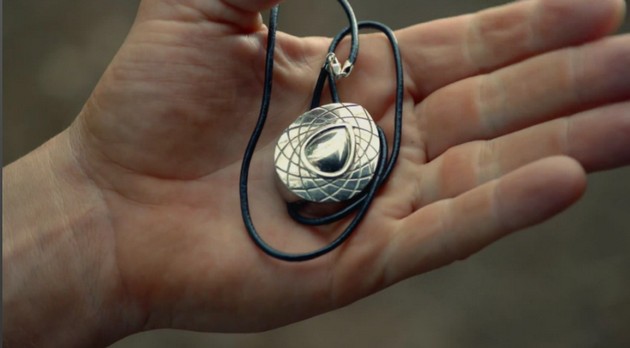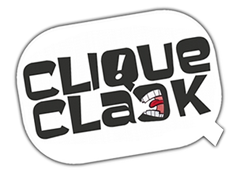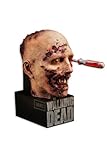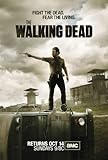Revolution & The Walking Dead: A tale of two apocalypses

‘Revolution’ and ‘The Walking Dead’. Two different apocalyptic shows in far different scenarios. But why is ‘TWD’ doing such a better job of pulling it off?
It was the worst of times. …
Thanks to the Mayans and their inability to create an infinite calendar, our obsession with postulating the “end of the world” has increased over the past few years, exemplified by all the movies and television series exploring that premise. Whether it’s a giant meteor, a zombie-inducing outbreak, or just some nerds with magic necklaces who stop electricity from flowing, Hollywood keeps coming up with ways to thrust humanity into a battle against global extermination. As an audience, we are fascinated watching the portrayal of how these characters adapt to extreme situations while imagining how we would cope after surviving such a massive global change.
While Revolution and The Walking Dead have drastically different premises, they both present a world where society has crumbled and people are forced to rebuild. I’ve voiced my concerns regarding Revolution’s focus on mythology over storytelling, but it wasn’t until I caught up on this season of TWD that I realized why Revolution has bothered me so much — because it can be done well (as TWD has proven), but they just keep following the path of the cliché.
Revolution gets flack for its ridiculous abuse of science and/or common sense; and I am right there with the critics <cough — magic necklace — cough>. But, how realistic is a zombie apocalypse? Why don’t people complain about the science of TWD? Because we are too wrapped up in those characters’ journeys to care how or why people have turned into “walkers”; we just want to watch Rick and the group fight for survival.
TWD develops its characters very well. Sure, it started with the typical search for a lost wife and son, which is a clichéd way to create empathy for Rick, but it quickly reunited the family-creating drama while fleshing out his character as well as Shane and Laurie. Revolution started in much the same way, with Charlie on a rescue mission for her brother. But the drive and desperation which compelled Rick to track his family seems watered down for Charlie. Her determination to find Danny appears to surface only when there’s a lull in the other subplots. And Charlie’s side journeys, while intended to make her a more dimensional character, keep hitting the same morality, one-dimensional note.
What it comes down to is believability. Does the characters’ behavior make sense given the circumstances they are put in, regardless of the plausibility of those situations? TWD fleshes out its characters and makes the audience want to suspend their disbelief; we are willing to believe zombies could exist because we want to see how these characters adapt to this new world. Now, some complained about the slow pace of season two of TWD and that the show focused too much on the characters instead of the zombie attacks that made the first season so engrossing. While I agree that some of the episodes felt longer than others, I would argue that they should have had more character development in the beginning of the season, especially with the relationship between Sophia and Carl, in order for the reveal at the end to have more impact. So much time (and so little action) took place between the time Sophia went missing and when they ultimately discovered her fate, that it took me a moment to realize the gravity of that scene (and recognize the character).
And while I feel that they slightly missed the mark on that aspect of season two, they hit it out of the park in regards to character development. The slow and inevitable decline of Shane into madness mirrored brilliantly with Rick’s transformation from idealistic believer into realistic survivor could not have been done in only one or two episodes. People don’t change instantly, they adapt over time. You still recognize the Rick from season one even now in the prison, but he’s not the same man. The choices he’s made, the actions he’s taken, have pushed him in a different direction.
Revolution tries to show this depth, but they keep rushing these realizations instead of letting them play out over time. With another LOST-esque flashback, we discover that Neville, before the blackouts, was weak and timid. But we learn this in such an over-the-top, cartoony way it was like they came up with every example of weakness and decided to use them all: menial job, domineering younger boss who fires him, and an insolent neighbor blaring music throughout the night, all of which shows how disrespected Neville feels. The next flashback is six weeks after the blackout when Neville’s brazen neighbor breaks in to raid their home. Six weeks of absolute chaos, but Neville still timidly tries to reason with the neighbor, and there is no hint that the past few weeks have toughened him up. It’s only when the neighbor strikes, pummeling him in front of his son, that Neville channels the strength of George McFly and fights back. He destroys the neighbor and rises up into a ridiculous Orsen Wells/Touch of Evil upward angle shot, displaying his instant transformation from weakling to conqueror. I almost expected him to pull his John Lennon circle sunglasses off the now crippled neighbor so that the audience in the cheap seats could really see that was the moment weak Tommy became Neville. But it’s too quick. You don’t get in one fight and instantly become a badass. As was stated in Giancarlo’s far better series, Breaking Bad, “just because you shot Jesse James, doesn’t make you Jesse James.” Revolution needs to slow down and let their characters adapt rather than completely change directions.
No scene better exemplifies the success of character development than the opening sequence of season three of TWD. There is no exposition, no dialogue, just ten people storming a house looking for a safe haven. The scene is brilliant. It tells the story of the last seven months without saying a word, and they could not have pulled that off if they hadn’t fully developed the characters in the previous two seasons. It doesn’t hurt that the actors on TWD are all amazing and believable, but without the strong writing leading up to that scene I don’t think it would have resonated with audiences the way it did.
Revolution has the potential to break out of its clichéd funk and build a world with strong characters. I hope that they do, because I want to watch scripted series like it, instead of 23 different singing competitions. But character is the key, so if they can develop the core characters, there may be a time when even I am willing to believe in magic necklaces … maybe.
 CliqueClack
CliqueClack


To sum up, TWD-Cable show, the other one-network show. Plus, the actress that plays Charlie was a poor choice.
This blog entry is absolutely spot on. Eloquent, Paul Miller. Eloquent. I have been trying to express this opinion in various discussions for the last month. And you nailed it.
TWD is about character development and story. It’s not a realistic situation (of course!). But it is about how real people might behave in such a situation, however unlikely. It is Science Fiction, but it’s still “real.”
Revolution is lazy and obvious with the way it handles it’s characters, and your examples were fantastic.
I love TWD, and I looked forward to Revolution but was soon disappointed.
Thanks for the post!
My brother suggested I might like this web site. He was entirely right. This put up truly made my day. You can not believe just how a lot time I had spent for this info! Thank you!